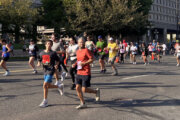Starting kindergarten is a momentous event for children and their parents. It can be exciting and scary — and often both at the same time. But there are lots of strategies to make the transition a smooth one.
Here’s some advice on what to expect and how to help your child adjust to starting school this fall.
Get Excited About Kindergarten
Parents can start the new school year off on a good foot by getting their child excited for kindergarten well before the first day of school.
Michael Little is an assistant professor at North Carolina State University whose work focuses on early childhood and early grade education policy. He says research shows that the transition to kindergarten is easiest when kids start talking about it early and often.
“This could be parents reading books about kindergarten to their kids or pre-K teachers coordinating a ‘moving up’ day where students visit a kindergarten classroom to see what it is all about,” he says.
Parents can also try to set up a time before school for their child to meet other classmates, maybe at the playground or a local park. Seeing a familiar face on the first day of school will make the transition easier.
As for books, The Horn Book Guide, which provides professional reviews of children’s literature, recommends a number of back-to-school picture books for parents to read with their kids to address worries and help spur conversations. Some to consider include:
— “Kindergarten Countdown!” by Marjorie Blain Parker.
— “The Day You Begin” by Jacqueline Woodson.
— “A Friend for Henry” by Jenn Bailey.
— “No! I Won’t Go to School” by Alonso Núñez.
[Read: What Do Kids Learn in Kindergarten?]
Learn to Say Goodbye
Saying goodbye can be the toughest part of beginning kindergarten, especially if your child has not attended preschool or day care. Experts say the way kids react is often linked to how parents respond to the separation.
“It can be challenging for children to leave to go to school, especially at the beginning, and it can be heartbreaking for parents and guardians as well,” says Ann Fitzgerald-Brown, a kindergarten teacher in Franklin, Massachusetts. “It is important for children to see their families being happy and calm and excited for them to begin their kindergarten year, because they in turn will be more relaxed and happier.”
One way to ensure a smooth start to the first day of school: Keep that goodbye short and sweet.
“The longer the goodbye, the longer the cry,” says Sue Austin, who has been teaching kindergarten for 33 years just outside of Buffalo, New York. “If parents stick around, it makes the kid feel like they have a reason to be crying.”
In addition to smiles and hugs and saying “I love you,” another helpful strategy is to let your child know specifically when you will see them later in the day. Austin says she always makes sure there is a schedule on the wall in her classroom so kids know exactly what activities they have and how much time is left in the day before they go home.
Parents can also find small ways to make the time apart more fun. Fitzgerald-Brown says it can be helpful for family members to write notes and leave them in lunches as a surprise for their child to discover during the day.
[READ: How Schools Incorporate Social-Emotional Learning]
Focus on Physical and SEL Skills
Kindergarten teachers aren’t expecting your child to come to school an expert at reading, writing and math. Those are meant to be learned in the classroom. They are more interested in children having practiced the social-emotional skills that underlie learning, like being able to listen to directions and complete tasks independently.
Parents can start working on these skills at home through games and other activities. For instance, scavenger hunts give students a chance to work on following directions.
Some other simple activities your child can work on at home include:
— Carrying groceries in from the car and helping put them away.
— Sorting laundry.
— Opening juice boxes, water bottles, snack fruit cups, etc.
— Carrying their own backpack to and from camp or other activities.
— Performing self-care skills, like going to the bathroom, washing hands and blowing their nose without help.
While social and emotional skills are top of the list for kindergarten teachers, motor skills are also key to success in kindergarten. Austin says since the pandemic began, the number of students lacking in fine-motor skills has really become noticeable.
Early in the year, Austin spends a lot of her time helping kids build fine-motor and hand strength because she finds students are so used to being on electronic devices that writing is exhausting for them. She recommends kids spend more time at home on physical activities, away from phones and tablets.
“Play outside, be on the swing set, cut and glue and color, and build muscle,” she says.
Play is a great way to build both physical strength and SEL skills, says Tracy Galuski, a professor of early childhood education at SUNY Empire State College.
“The foundation for early learning is play. Through their play children experience empathy, collaboration, discovery and creative thinking,” Galuski says. “As parents worry about what they need to do to get their children ready, the simple answer is read to them, cook with them, assign chores and daily living tasks, and put down the electronics for some good old-fashioned outdoor activities.”
[READ: Play-Based Learning vs. Academics in Preschool.]
Establish a Routine
At home, parents can also help their child prepare for the school day by practicing and sticking to morning and evening routines. This is especially true for the beginning of the school year, when children might need extra time adjusting after later bedtimes and meal times during the summer. Having a routine for breakfast, dinner and bedtime will help with the transition once school starts, experts say.
It may take a few days or even weeks for your child to get adjusted to kindergarten. Some children might come home exhausted from the effort of sitting and listening, or just getting through a full school day adjusting to new rules and expectations, along with new students and adults who aren’t their family.
If you find your child’s anxiety increasing or not going away, it might be a good idea to check in with the teacher or counselor for suggestions. But educators also advise not rushing into fixing things. Growing pains are normal.
“Students might come home hungry and tired and possibly a little bit cranky at first. It can be hard to transition from summer to school and it is important to remember that they have been working hard all day long,” says Fitzgerald-Brown. But hopefully, she says, before you know it, “students will come home happy and excited to share what they did during their day.”
More from U.S. News
Play-Based Learning vs. Academics in Preschool
What Is Reggio Emilia Education?
Getting Ready for Kindergarten originally appeared on usnews.com







